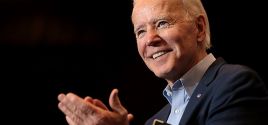Speak No Evil of the Fed, Decrees Keynesian High Priest Paul Krugmanby Will GriggApr. 11, 2012 |
Popular 
Biden Commutes Sentences of 37 of 40 Federal Death Row Inmates - Excludes Robert Bowers, Dylann Roof

U.S. 'Shoots Down Own Jet' Over Red Sea in 'Friendly Fire Incident'

Putin Accuses 'Ethnic Jews' of Tearing Russian Orthodox Church Apart

Ohio Senate Passes Bill Aimed at Outlawing Criticism of Israel, Criminalizing Gospel

Saudi National Rams Car Into Germans at Christmas Market in Suspected Terrorist Attack [UPDATED 2X]
  Outside of an asylum for the clinically deranged, it's difficult to find anyone as reality-impaired as Paul Krugman, the purported economist and apologist for the Federal Reserve who was awarded a Nobel Prize for peddling Keynesian nostrums from his perch on the New York Times editorial page. Actually, that comparison is unfair: Even those who suffer from acute mental illness have a better understanding than Krugman of the relationship between cause and effect. Outside of an asylum for the clinically deranged, it's difficult to find anyone as reality-impaired as Paul Krugman, the purported economist and apologist for the Federal Reserve who was awarded a Nobel Prize for peddling Keynesian nostrums from his perch on the New York Times editorial page. Actually, that comparison is unfair: Even those who suffer from acute mental illness have a better understanding than Krugman of the relationship between cause and effect.In his most recent dispatch, Krugman denounces what he calls "destructive" criticism of the Fed, insisting that such impious talk impedes the ability of the Regime's official counterfeiters to inflate the money supply. According to Krugman, inflation is an unalloyed blessing, and we should pray for the Fed to rain it down upon us without measure: The attackers want the Fed to slam on the brakes when it should be stepping on the gas; they want the Fed to choke off recovery when it should be doing much more to accelerate recovery. Fundamentally, the right wants the Fed to obsess over inflation, when the truth is that we'd be better off if the Fed paid less attention to inflation and more attention to unemployment. Indeed, a bit more inflation would be a good thing, not a bad thing.As a high priest of the Keynesian cult, Krugman exhorts Americans to prostrate ourselves before Bernanke the Blessed, oracle of the all-powerful Fed, and humbly beseech him to debase our currency with greater vigor. Yes, this would mean sacrificing our savings, investments, and whatever remains of our private retirement accounts; it would mean undisguised catastrophe for millions of American households already on the brink of ruin owing to stagnant earnings and steadily increasing living expenses. We must simply accept such hardships, and any others Bernanke and his comrades see fit to inflict on us, with reverent stoicism – if not chastened gratitude for the privilege of being ruled by such wise and insightful beings -- because audible criticism of their ministrations impedes their ability to transmute debt into prosperity. And of course, their failures don't impeach their abilities or demonstrate the foolishness of their ideology, but rather are to be seen as the result of our lack of faith in them. Like others of his persuasion, Krugman believes that thrift is sinful and profligacy is virtuous. A few years ago, during debate over the Obama administration's "stimulus" proposals, the Nobel-winning Keynesian nitwit shared his formula for economic recovery: "Spend now, while the economy remains depressed; save later, once it has recovered." This makes as much sense as saying, "Feast now while the pantry is bare; diet later, once the larder overflows." Krugman's praise for debt-peddlers is unstinting, and he zealously denounces those unwilling to become slaves to them. In a fashion that might have earned the admiration of Josef Stalin, Krugman has accused the thrifty of acting as economic "wreckers": He has blamed the ongoing -- and deepening -- depression on what he calls a "savings glut." This dreadful surplus originated with disciplined and industrious Asian workers and countries who saved what they earned, and it continues today as, in Krugman's words, "impoverished consumers have rediscovered the virtues of thrift," thereby reducing consumer demand. Perhaps the only recorded instance in which Krugman has offered praise for austerity came in his discussion of the Obamacare act, which contains a provision creating an "Advisory Board" in charge of financial triage -- the much-discussed "death panel" that would either authorize or deny funding for various kinds of medical treatment. As Krugman approvingly noted, the Advisory Board would have "the ability to make more or less binding judgments on saying this particular treatment doesn't do any good medically and so we are not going to pay for it. That is actually going to save a lot of money" -- by abbreviating the lives of people who are deemed unworthy of such expenditures, of course. Arguably the best way to measure the distance separating Paul Krugman from reality was his suggestion that the government stage a phony alien invasion in order to generate support for federal "stimulus" spending. Of such stuff are Nobel-winning public intellectuals made. |



